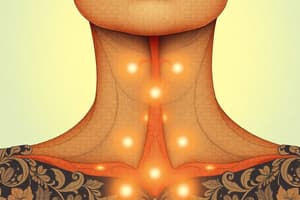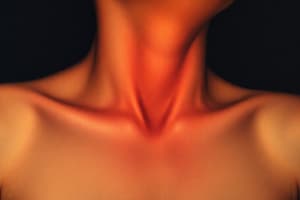Podcast
Questions and Answers
What is the primary function of hormones in the endocrine system?
What is the primary function of hormones in the endocrine system?
- To provide structural support to cells
- To transmit nerve impulses
- To circulate in the blood and influence the activity of target organs (correct)
- To secrete digestive enzymes
What condition is characterized by stoutness and sluggish metabolism due to insufficient thyroid hormone production in adults?
What condition is characterized by stoutness and sluggish metabolism due to insufficient thyroid hormone production in adults?
- Cretinism
- Myxedema (correct)
- Simple Goitre
- Hypersecretion
Which glands are responsible for secreting hormones directly into the bloodstream without the use of ducts?
Which glands are responsible for secreting hormones directly into the bloodstream without the use of ducts?
- Both A and B
- Adrenal glands
- Endocrine glands (correct)
- Exocrine glands
What type of hormones are secreted by the adrenal cortex?
What type of hormones are secreted by the adrenal cortex?
What is homeostasis?
What is homeostasis?
What role does the pituitary gland play in the endocrine system?
What role does the pituitary gland play in the endocrine system?
What are pheromones?
What are pheromones?
Which of the following is true about hypersecretion?
Which of the following is true about hypersecretion?
Flashcards
What is homeostasis?
What is homeostasis?
The maintenance of a stable internal environment despite external changes.
What is the endocrine system?
What is the endocrine system?
A system of glands that secrete hormones directly into the bloodstream.
What is the thyroid gland?
What is the thyroid gland?
The largest endocrine gland located in the neck, responsible for producing thyroxine.
What is hypersecretion?
What is hypersecretion?
Signup and view all the flashcards
What is the pituitary gland?
What is the pituitary gland?
Signup and view all the flashcards
What are the adrenal glands?
What are the adrenal glands?
Signup and view all the flashcards
What are cortical hormones?
What are cortical hormones?
Signup and view all the flashcards
What is adrenaline?
What is adrenaline?
Signup and view all the flashcards
Study Notes
Endocrine System Definitions
- Control and Coordination: Mechanisms for maintaining internal stability and responding to external changes.
- Homeostasis: Maintaining a stable internal environment despite external shifts.
- Chemical Control: Regulated by hormones from endocrine glands.
- Neural Control: Regulated by nerve impulses.
- Endocrine System: Network of glands releasing hormones directly into the bloodstream.
- Exocrine Glands: Secrete products through ducts.
- Endocrine Glands: Ductless glands releasing hormones into the bloodstream.
- Hormones: Chemical messengers, produced by endocrine glands, influencing target organs.
- Pheromones: Hormones released outside the body, affecting other individuals' physiology or behavior.
Thyroid Gland
- Thyroid Gland: Largest endocrine gland in the neck, producing thyroxine.
- Thyroxine: Hormone regulating metabolism, growth, and development.
- Hypersecretion: Excessive hormone production.
- Hyposecretion: Insufficient hormone production.
- Cretinism: Infantile hypothyroidism leading to stunted growth and mental development.
- Myxedema: Adult hypothyroidism causing sluggish metabolism, swelling, and weight gain.
- Simple Goiter: Enlarged thyroid due to iodine deficiency.
Adrenal Glands
- Adrenal Glands: Small glands atop the kidneys.
- Adrenal Cortex: Outer layer of the adrenal gland.
- Adrenal Medulla: Inner layer of the adrenal gland.
- Cortical Hormones (Corticoids): Steroid hormones from the adrenal cortex regulating metabolism, mineral/water balance, and sexual characteristics.
- Adrenaline (Epinephrine): Hormone from the adrenal medulla, preparing the body for "fight or flight."
- Noradrenaline (Norepinephrine): Hormone from the adrenal medulla regulating blood pressure.
Pituitary Gland
- Pituitary Gland: "Master gland" controlling other endocrine glands.
- Tropic Hormones: Pituitary hormones stimulating other endocrine glands.
Pancreas
- Pancreas: Dual-function gland (endocrine and exocrine).
- Islets of Langerhans: Endocrine cell clusters in the pancreas.
- Insulin: Pancreatic hormone lowering blood glucose levels.
- Glucagon: Pancreatic hormone raising blood glucose levels.
- Diabetes Mellitus: Disease from insufficient insulin, characterized by high blood glucose.
- Hypoglycemia: Abnormally low blood glucose levels.
Studying That Suits You
Use AI to generate personalized quizzes and flashcards to suit your learning preferences.




